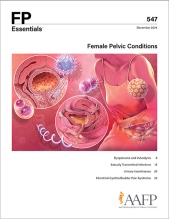
This clinical content conforms to AAFP criteria for CME.
Sexually transmitted infection rates are increasing in the United States, with significant increases in the rates of syphilis among patients of reproductive age and, subsequently, congenital syphilis. Syphilis screening is recommended in sexually active patients 15 to 44 years of age in communities with high syphilis rates and in all pregnant patients at the time of diagnosis or prenatal intake, in the third trimester, and at delivery. Screening for chlamydia and gonorrhea is currently recommended in asymptomatic, sexually active patients younger than 25 years, as well as in older patients with risk factors. When clinicians are diagnosing active infections, patients with anogenital ulcerations should be tested for syphilis and herpes and treated empirically while awaiting test results. Treatment of syphilis depends on the disease stage; first-line regimens all involve penicillin G. Patients with vaginal discharge and dysuria should be tested for gonorrhea and chlamydia using nucleic acid amplification testing. Doxycycline should be used to treat chlamydia because it is more effective in rectal chlamydia, which often coexists with vaginal infection. Single-dose azithromycin is an alternative in populations at risk for poor medication adherence or confidentiality concerns. Ceftriaxone should be used to treat gonorrhea. Increasing drug resistance to gonorrhea is a growing public health threat, and clinicians must work with public health departments in cases of suspected treatment failure.
Subscribe
From $350- Immediate, unlimited access to FP Essentials content
- 60 CME credits/year
- AAFP app access
- Print delivery available
Edition Access
$44- Immediate, unlimited access to this edition's content
- 5 CME credits
- AAFP app access
- Print delivery available
